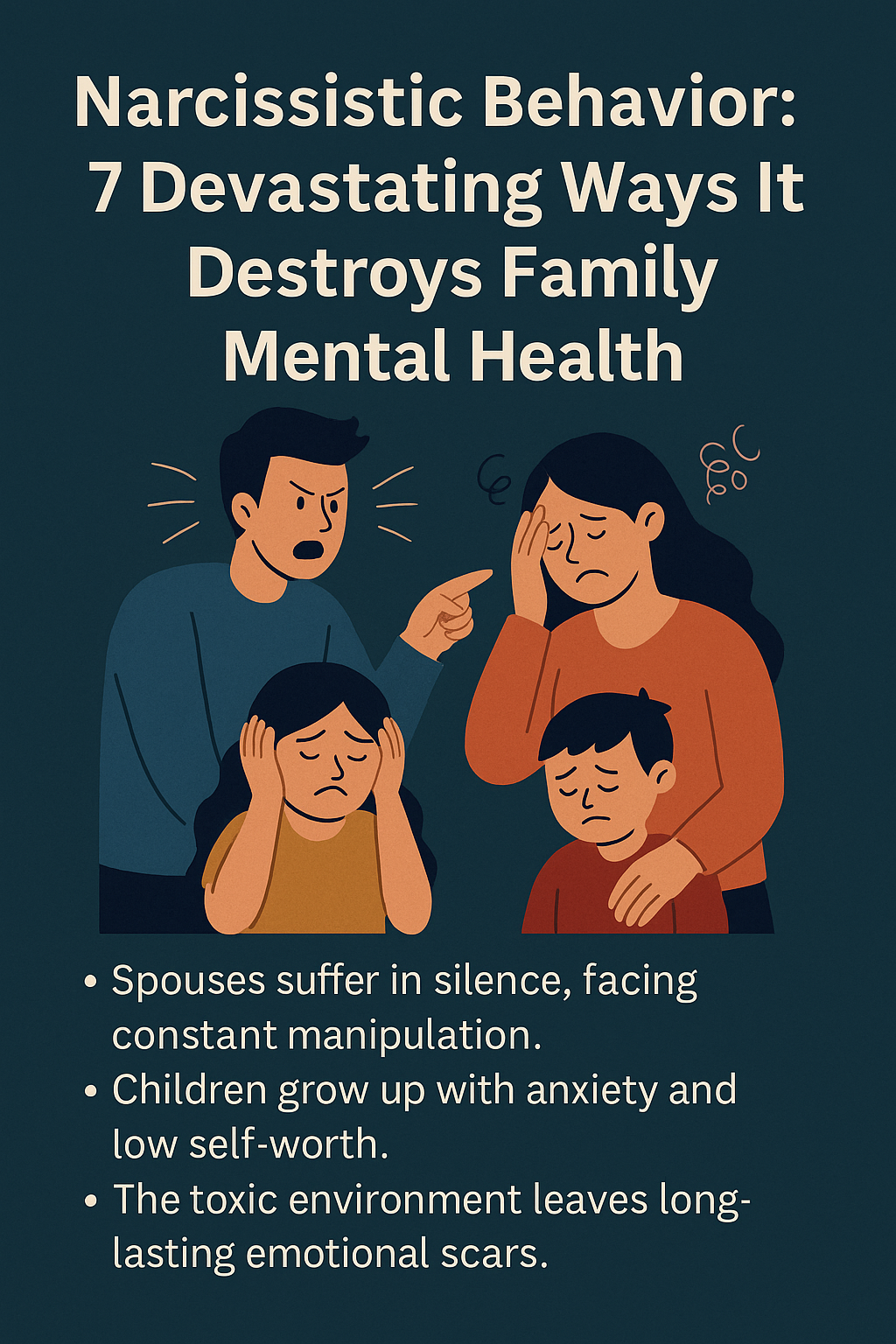
Narcissistic Behavior: 7 Devastating Ways It Destroys Family Mental Health
Introduction: The Hidden Toll of Narcissistic Behavior on Families
Living with a narcissistic person can feel like walking on eggshells every day. The psychological effects of narcissistic behavior extend far beyond surface-level disagreements or personality clashes. For a spouse and children, this ongoing exposure can erode their emotional stability, self-worth, and overall mental health. Understanding how narcissistic behavior affects the family system is vital for early intervention and long-term healing.
Narcissistic Behavior: What It Looks Like in the Home
A narcissistic individual often exhibits excessive self-focus, lacks empathy, and craves admiration. In a family setting, this can manifest as:
- Emotional Manipulation
- Gaslighting (making others doubt their reality)
- Controlling behaviors
- Lack of accountability
- Verbal abuse and blame-shifting
These patterns create a toxic home environment where the spouse and children constantly feel invalidated, confused, and emotionally drained.
How Narcissistic Behavior Affects the Wife’s Mental Health
1. Emotional Exhaustion and Burnout
A narcissistic spouse often demands constant attention and validation, while offering little in return. The wife may become emotionally depleted from trying to maintain peace or meet unrealistic expectations.
2. Erosion of Self-Esteem
Narcissistic partners frequently criticize or belittle their spouses. Over time, this leads to diminished self-esteem, making the wife question her worth, competence, and even her sanity.
3. Increased Anxiety and Depression
The unpredictability of living with a narcissist can result in chronic anxiety. The wife may fear triggering an outburst or becoming the target of blame. This can lead to symptoms of depression, helplessness, and isolation.
4. Trauma Bonding
Despite the emotional abuse, many wives remain in the relationship due to trauma bonding. The cycle of abuse followed by affection confuses emotional boundaries and keeps them stuck.
The Psychological Effects of Narcissistic Behavior on Children
1. Insecurity and Low Self-Worth
Children raised by a narcissistic parent may internalize criticism and grow up believing they are never good enough. Their self-worth becomes contingent on pleasing others.
2. Fear of Expression
In such households, children may fear voicing opinions or emotions, anticipating ridicule or punishment. This stunts emotional development and healthy communication.
3. Anxiety and Hypervigilance
Living in an emotionally volatile environment causes children to become hyper-aware of others’ moods. This can result in generalized anxiety and an inability to relax.
4. Identity Confusion
Narcissistic parents often impose unrealistic expectations on children, forcing them into roles (e.g., the achiever, caretaker). This creates identity confusion and long-term emotional distress.
5. Future Relationship Struggles
Children who grow up under narcissistic influence may struggle with trust, boundaries, and self-worth in their adult relationships, often replicating toxic patterns.
How the Narcissistic Parent Controls the Family Dynamic
1. Divide and Rule
Narcissists often pit family members against each other to maintain control. This can isolate the spouse and manipulate the children into taking sides.
2. Triangulation
They may use one child to convey messages to the other parent or compare siblings unfairly, breeding resentment and insecurity.
3. Gaslighting the Whole Family
By consistently denying abusive behavior or shifting blame, the narcissistic parent creates confusion and self-doubt among all family members.
Long-Term Mental Health Risks for the Family
1. Complex PTSD
Years of emotional abuse can lead to Complex Post-Traumatic Stress Disorder (C-PTSD), marked by flashbacks, hypervigilance, and emotional numbness.
2. Codependency
Family members may become overly reliant on approval from others, sacrificing their own needs and desires.
3. Learned Helplessness
Repeated emotional invalidation can teach spouses and children that they are powerless to change their circumstances, promoting passivity and despair.
Path to Healing: What Can Be Done?
1. Recognize the Pattern
Acknowledging that narcissistic behavior is affecting your mental health is the first critical step. Validation from a therapist or support group can help break the cycle of doubt.
2. Set Boundaries
Establishing clear emotional and physical boundaries is essential for protecting yourself and your children. This may include limiting interactions or disengaging from manipulative conversations.
3. Seek Professional Help
Therapy—individual, family, or trauma-informed—can provide tools to rebuild self-esteem and manage anxiety. Children may also benefit from child-focused therapy to process emotional confusion.
4. Practice Self-Care
Journaling, mindfulness, physical activity, and connecting with a trusted support system are vital for emotional resilience.
5. Legal and Safety Planning
In severe cases, legal intervention or safety planning may be required. Consult professionals about your rights and available resources.
Conclusion: Protecting Your Peace and Healing from Narcissistic Harm
Narcissistic behavior is not just a difficult personality trait—it can have devastating consequences on the mental health of spouses and children. Recognizing the signs, prioritizing mental well-being, and seeking professional intervention are crucial steps toward breaking free from the emotional grip of narcissistic abuse. You deserve a peaceful, safe, and emotionally nurturing environment. Healing is possible—and it begins with awareness and action.

